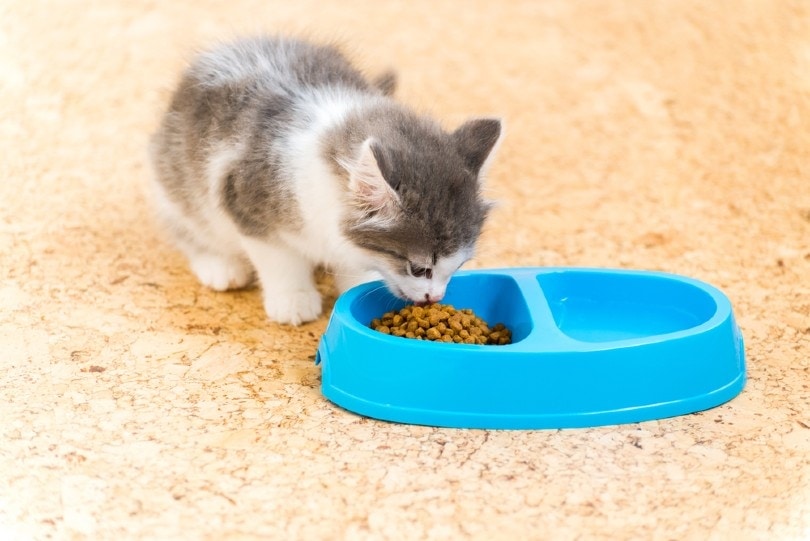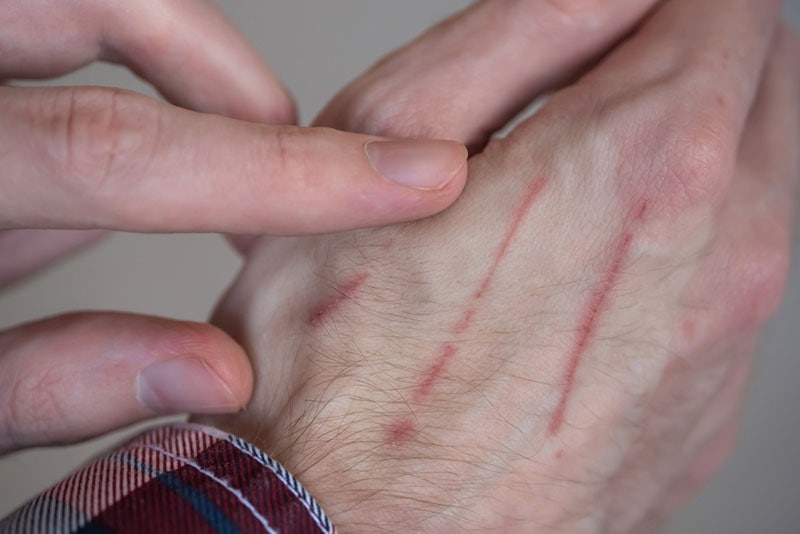Is Cat Constipation an Emergency? Vet-Reviewed Facts, Signs & Treatment

Updated on
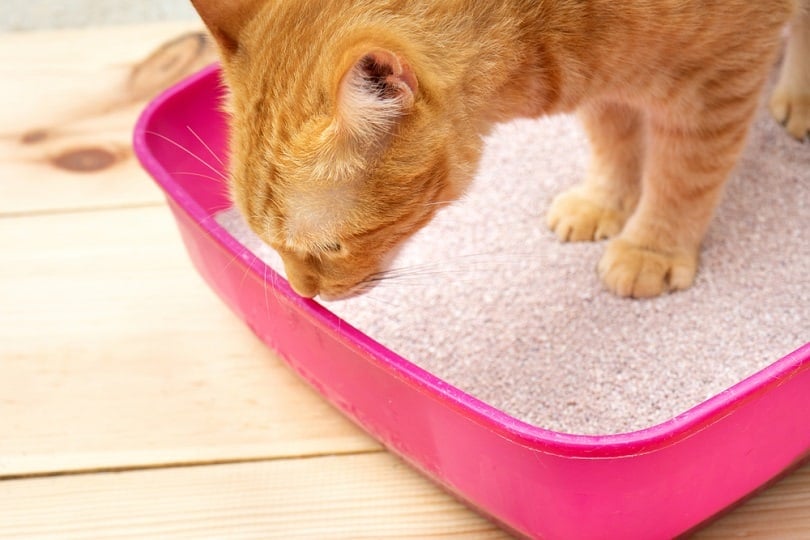
Click to Skip Ahead
It is natural to be concerned when our feline companions show signs of discomfort or ill health, but sometimes it’s hard to tell how urgent a situation is. Cats are famous for hiding illnesses and injuries, but what about constipation? Is it an emergency?
A generally healthy cat should pass a stool at least once a day or not longer than 48 hours unless they are recovering from diarrhea or surgery. If your cat has not passed feces for longer than 48 hours, you should contact your vet immediately and consider it a matter of urgency.
What Is Cat Constipation?
Cat constipation can be defined by infrequent or absent bowel movements that are difficult and uncomfortable for your cat. This can mean your cat’s stool is large, hard, or nonexistent.
Cat constipation can be a short-term problem but requires veterinary attention if it lasts longer than 2 days.
Is Constipation an Emergency?
Cat constipation is not always an emergency, but it is safer for your kitty to treat it as one. If your cat is battling constipation, you should contact your vet since there could be a serious underlying cause you must catch as early as possible. This is particularly important if you are seeing your cat unsuccessfully trying to defecate.
There are many causes for cat constipation, ranging from stress to serious health issues, so it is always best to consult your vet within 24 hours. Some causes may be mild and can be treated with lifestyle and dietary changes, while some may need the medical attention of your veterinarian.
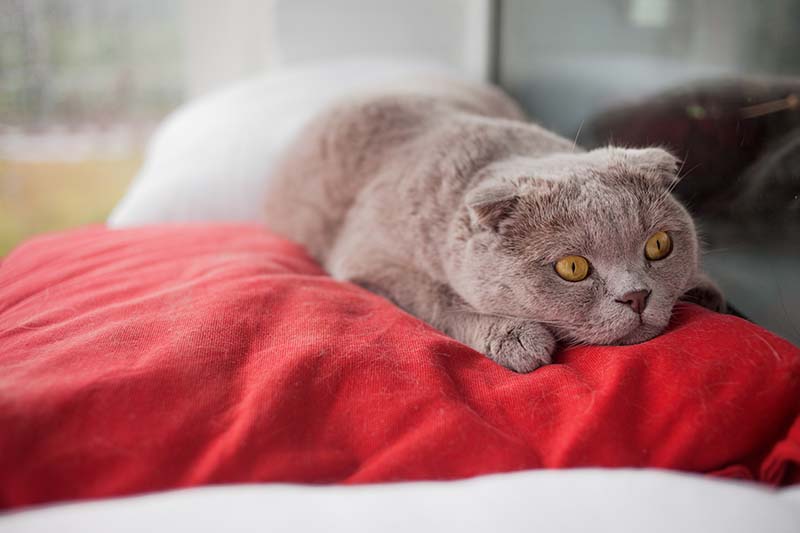
Causes of Constipation in Cats
If your cat is experiencing difficult or uncomfortable bowel movements or there is no stool at all, there can be various factors that contribute to constipation, ranging from mild to serious. Different causes can include:
- Dry food diets
- Litter box issues
- Dehydration
- Inactivity
- Low fiber
- Excessive grooming leading to hairballs
- Anxiety or stress
- Obstructions such as bones
- Pain or other spine issues
- Kidney issues
- Feline megacolon
Signs of Constipation in Cats
It can be hard at times to know if your cat is constipated, especially if your cat doesn’t use a litter box. A healthy cat stool is usually well-formed, moist, and dark in color. Signs of constipation may include:
- Dry stools
- Discomfort while trying to pass a stool
- Firm abdomen
- Entering and exiting the litter numerous times
- Avoiding the litter box
- Straining or whining while defecating
- No stool at all
If you have noticed any of these signs, it is best to contact the vet to rule out any underlying medical issues. However, because constipation can sometimes indicate other health issues, there may be other signs, such as:
- Hiding
- Drinking more or less fluids
- Decrease in appetite
- Difficulty jumping up
- Vomiting
- Weight loss
- Muscle loss
- Walking stiffly
If your cat shows any of these signs, you should contact your veterinarian immediately, even if they present with or without constipation.
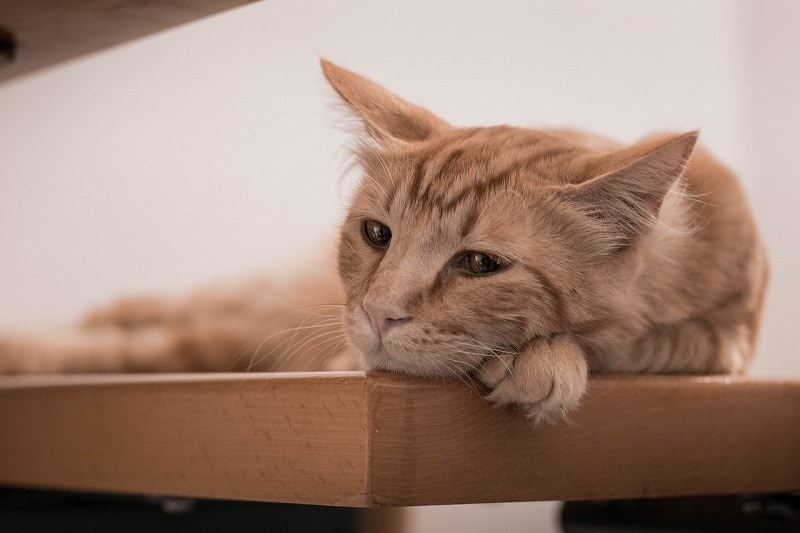
Is It Really Constipation?
Sometimes, what appears to be straining to defecate, is actually straining to urinate, and this can be a real emergency. Cats that are going in and out of the litter box, licking their genitals or crying when trying to pass urine can be a sign of cystitis, urinary tract infection or urethral obstruction, which is a potentially deadly situation that almost exclusively affects male cats.
If you’re not sure if the problem is a number one or a two, the best thing to do is contact your vet. They will be able to determine what is going on with a physical exam and get your kitty back on track.
Treating Cats With Constipation
Treatment for cats with constipation will depend on the severity. While some issues that cause constipation can be easily treated, others need to be addressed by your veterinarian. Constipation must also be treated as soon as possible to prevent further issues and decrease the risk of permanent damage. If left untreated, it can lead to megacolon that cannot be treated and can sadly be fatal.
The first step in treating constipation is to move the obstructed feces, which can sometimes include an enema or administering fluids. If your cat is experiencing severe constipation, it may need to be sedated for an enema or prepared to have the blockage removed. It’s important to note that you should never attempt an enema at home since human enema kits are unsafe for cats.
Your veterinarian will then need to determine the underlying cause and address the issue. You may need to change your cat’s diet and lifestyle, such as moving litter boxes or changing litter, cleaning water bowls more often, or switching to a diet higher or lower in fiber. However, treating the underlying issue will be paramount to prevent a recurrence.
Sadly, if the constipation is due to a megacolon that doesn’t respond to medication, they may need surgery to remove a section of the affected bowel.
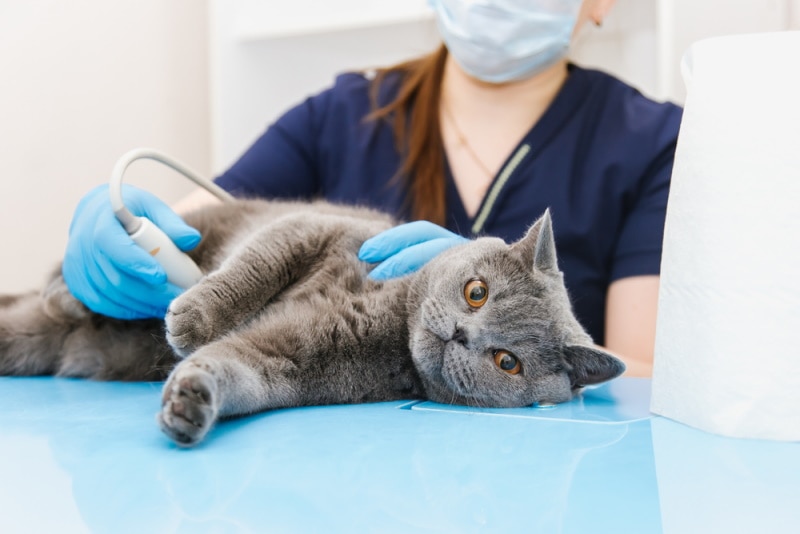
Preventing Constipation in Cats
Prevention is better than the cure, but while that is not always possible, there are some things you can do at home to help prevent constipation and keep your cat happy and healthy.
- Minimize stress and anxiety
- Help your cat maintain a healthy weight
- Speak to your vet about your cat’s diet, fiber-rich foods, and probiotics
- Ensure your cat’s litter boxes are always clean and in a suitable place
- Keep your cat’s feeding bowls clean
- Ensure your cat is drinking enough water
- Stay up to date with regular veterinary check-ups to ensure your cat is healthy
Keep Track of Your Cat’s Litter Box Habits
Monitoring your cat’s bowel movements can help you determine their state of health. While it may sound peculiar, you should track your cat’s bowel movements. Monitor how frequently your cat defecates as this will make it easier to know when things aren’t right. It’s important to know what is normal for your cat in order to recognize when things aren’t normal.
If you notice hard and dry stools or your cat experiences discomfort while making a bowel movement, you should get your cat to the veterinarian to assess the condition. The same can be said for watery, frequent stools that could be a sign of diarrhea. It is especially important to get to the vet to prevent dehydration.
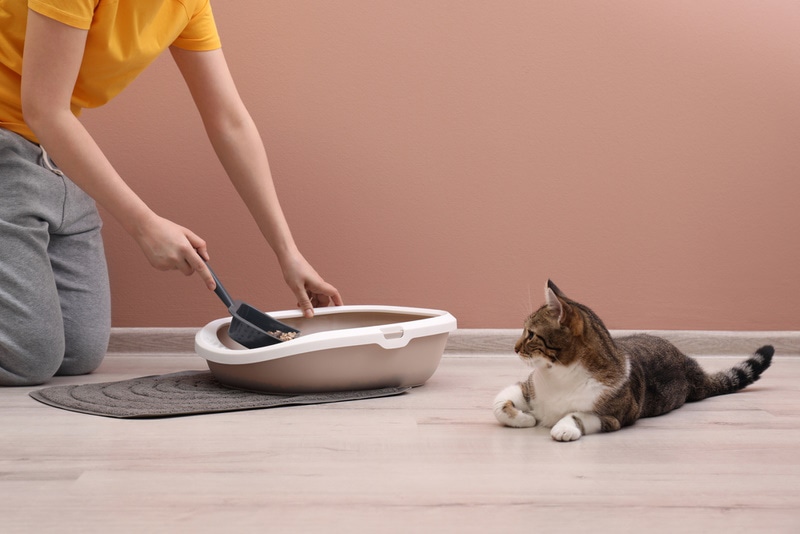
Conclusion
In some cases, constipation can pass on its own. However, as a cat parent, treating it as an emergency is best because it could end up that way, especially if your cat hasn’t had a bowel movement in over 48 hours. There are many causes for cat constipation, and you need the guidance of your veterinarian to ensure your cat stays healthy. To prevent constipation, ensure your cat is well-fed and hydrated and that their litter boxes are clean and easy to access. Try to avoid stressful situations and monitor your cat’s bowel movements. If you are in doubt at any time, call your vet.
Featured Image Credit: Guajillo studio, Shutterstock


